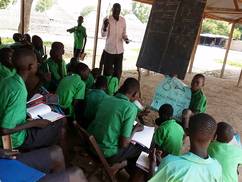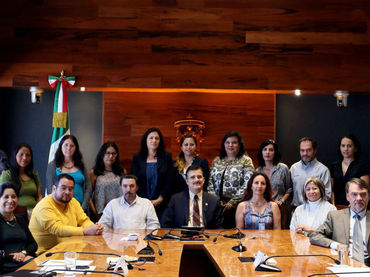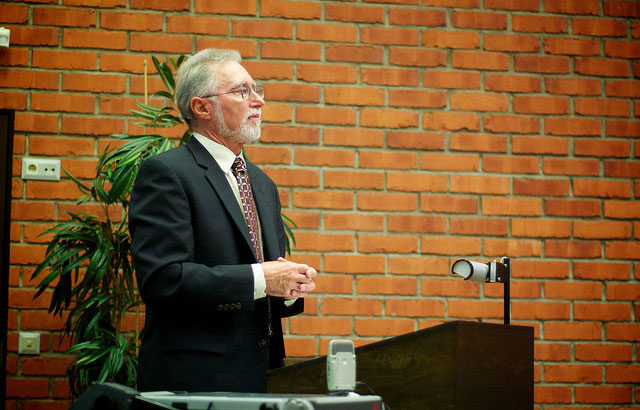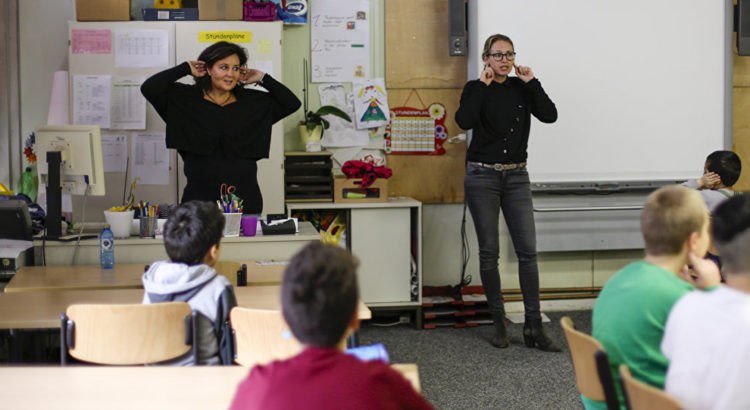Mundo / 10 de julio de 2016 / By Kevin Young
While the world must reduce its resource consumption and output of pollution in the face of climate change, we don’t need to demand that people sacrifice their economic well-being, says radical economist Robin Hahnel. «Green growth is possible.»
Can we have economic growth while confronting climate change? In this interview, radical economist Robin Hahnel argues that ecological sustainability is perfectly compatible with increases in economic well-being. While we must drastically reduce the physical matter used and discharged within the global economy («throughput»), we can simultaneously improve life for most people. Fighting for an ecologically sustainable form of growth must be central to the work of the climate justice movement.
Kevin Young: Many environmentalists argue that we must limit economic growth or even undergo de-growth in order to adequately reduce greenhouse gas (GHG) emissions. Many economists argue that it’s possible to «decouple» growth and emissions. Who’s right?
Robin Hahnel: With few exceptions economists were completely oblivious to the fact that our economic train was barreling toward environmental disaster. So we owe a huge «thank you» to environmentalists for warning us that the kind of economic growth we have been pursuing will not only continue to damage the environment in myriad ways, it is on course to trigger irreversible, cataclysmic climate change within a few decades.
However, those who point out that it is possible for economic well-being per capita to grow indefinitely while protecting the environment are correct. Yes! Green growth is possible. When spokespeople for the steady-state and de-growth movements deny that green growth is possible and say that we must reconcile ourselves to stagnant or declining living standards to avoid environmental disaster, they are wrong, and do the environmental movement great harm.
What cannot continue to grow indefinitely is throughput. Ecological economists define throughput as physical inputs from the natural environment (e.g., iron ore or topsoil) used in production processes, as well as physical outputs of production (usually thought of as waste or pollution) such as airborne particulate matter and greenhouse gases released back into the environment where they are absorbed in natural «sinks.» Throughput must be measured in some appropriate physical units such as tons of iron ore, cubic meters of topsoil, and cubic tons of carbon dioxide.
What economists define as economic growth is not the same as growth of throughput. When economists refer to economic growth they mean growth of GDP, the value of the final goods and services produced during a year. Of course, growth of GDP fails to represent growth of economic well-being for a host of reasons that are well known. Nonetheless, assuming it could be measured properly, economic well-being can grow even as throughput remains constant or decreases. In the literature this is called decoupling, which means separating the growth of the value of what we produce from the quantity of throughput we use to produce it.
Where critics are correct is that business-as-usual economic growth has failed to decouple. In fact, it has us on a suicidal trajectory! But that does not mean that a different kind of growth — growth that increases throughput efficiency at the same rate that it increases labor productivity, and therefore puts no more strain on the environment — is impossible. And that is what decoupling means: increasing throughput efficiency as much as we increase labor productivity. (As long as the rate of growth of productivity rises no faster than the rate of growth of throughput efficiency, throughput will not increase.) Moreover, there is plenty of evidence that decoupling is possible. We are doing it right now for greenhouse gas throughput. Of course we have to reduce GHG throughput much faster still to avoid cataclysmic climate change. The name of the game is to decouple increases in economic well-being from throughput big time. But anyone who argues that decoupling is impossible is wrong on both theoretical and empirical grounds.
From the perspective of the climate justice movement, what are the concrete implications of the debate about growth?
Those who deny the possibility of decoupling are both wrong and detract us from the task at hand. Worse still, they make it impossible to build a political coalition sufficiently numerous and powerful to prevent climate change. Why would lower classes in advanced economies support a movement that says their children cannot aspire to a higher standard of living? Why would any of the four billion people living in less developed economies who have yet to enjoy the benefits of economic development sign onto a movement that tells them they must give up any hope of enjoying those benefits? The answer is they won’t! Because economic growth is necessary to improve the lives of most of the world’s population, a «de-growth» platform is suicidal when trying to build a mass movement to prevent climate change. The tragedy is that our environmental movement does not have to preach this self-defeating sermon. Preventing climate change, and better protecting the environment in general, is perfectly compatible with increases in economic well-being.
Some argue that while ecologically sustainable growth is hypothetically possible, it is impossible within a capitalist system. Richard Harris, for instance, claims that green-growth advocates «assume that capitalism is sufficiently malleable that capitalist fundamentals can be ‘inverted’ such that corporations can, in one way or another, be induced to subordinate profit-making to ‘saving the Earth.'»
Capitalism can become a lot more green than it has been to date — which is damn lucky since replacing capitalism with eco-socialism isn’t going to happen fast enough to prevent climate change. Capitalists pursue profits via the easiest route. Of course they are not going to save the Earth out of the goodness of their hearts. But there is no reason we cannot make the route to profits from extracting and burning fossil fuels more difficult or impossible. And there is no reason we cannot make the route to profits by producing renewable energy and retrofitting buildings much more lucrative. There are many ways to intervene in markets to change results, and we will have to use all of them over the next decades because the kind of green new deal we need is going to have to be launched while economies are still very much capitalist.
What would a «green new deal» look like under capitalism? And are there any precedents for that kind of massive shift in economic priorities?
Replacing fossil fuels with renewables, transforming not only transportation but industry and agriculture as well to be much more energy efficient, and rebuilding our entire built infrastructure to conserve energy, will be an immense, historic undertaking. What is needed if we are to avoid unacceptable climate change is the greatest technological «reboot» in economic history. This is the only way to avoid literally broiling ourselves to death at some point in the century ahead, and, I might add, the only way to re-employ the tens of millions who lost their jobs in the Great Recession and the hundred million young people who will need jobs over the next two decades. The precedent is the massive shift of economic priorities the US economy went through between 1939 and 1942. Just as we responded to the menace of global fascism by shifting over 50 percent of production from consumption goods to war materials, we need a similar response to the equally dangerous menace of cataclysmic climate change.
Robert Pollin and collaborators at the Political Economy Research Institute have fleshed out the details of what a Green New Deal would look like not only for the United States, but also for many other parts of the world economy. A major finding is how little it would cost over the next several decades for the world to become free of fossil fuels. In short, Pollin and his collaborators demonstrate that the barriers to preventing climate change are political, not technological.
To what extent does confronting the climate crisis require changes in the consumption of the average working person in the global North?
What we consume will have to change. Where and how we live and work and transport ourselves will have to change. We will live more compactly. We will share larger, superior open spaces than we have today. We will consume more public and fewer private goods. But there is no reason that economic well-being cannot increase for future generations in the global North while adequately protecting the environment. Decarbonization will require that we live differently, but we can all live far better — and that is the message the environmental movement needs to emphasize.
You’ve also written a lot about international climate policy. Could you comment on the strategy of the Climate Justice Movement (CJM) vis-à-vis the 2015 COP 21 meeting in Paris?
The Climate Justice Movement made a strategic blunder. After every country announced its emission reduction pledge, the CJM had the opportunity to launch a major international campaign explaining which pledges were consistent with a country’s responsibilities (for creating the problem) and capabilities (for making contributions toward solving the problem.) Before the Paris meetings equity researchers had reached a broad consensus for how to judge proposals, and evaluations were readily available (see for example the Climate Equity Calculator). These evaluations showed that the pledges of more developed countries in most cases fell far short of their fair shares, while most pledges from less developed countries were consistent with their fair shares. The CJM should have made support for countries making fair pledges, and criticism of countries whose pledges fell short, its major priority in Paris. Progressives’ suspicions of global climate deals stem partly from the carbon trading mechanisms included in prior accords. Most leftists in the global North seem to reject carbon trading unequivocally, as a scam devised by polluters to thwart real change. But you’ve argued that carbon trading can be an effective short-term way to cut emissions while we work toward the longer-term goal of replacing the capitalist system.
The amount of ill-informed criticism of carbon markets, carbon trading, carbon offsets, etc., from the left over the past two decades would fill an ocean. Two things drive this fury: (1) None of us likes the idea of placing a price on nature and putting nature up for sale. In other words, rejection of carbon markets in any form is part of a justifiable disgust with the commercialization of life. (2) Many on the left — although by no means all — understand that markets are part of the problem. The problem is not just private ownership of the means of production. Coordinating our economic activities through markets is also an integral part of the economics of competition and greed we need to extricate ourselves from. So, people reason, if markets are part of the problem, how can a carbon market be part of the solution?
But besides massive ignorance regarding how carbon markets do and can work, here is what many leftists fail to understand: We live in a market system. And until we do not, the only way to change what happens is to intervene in or regulate markets. Do socialists denounce campaigns to raise the minimum wage on grounds that anything short of eliminating wage slavery altogether is a «false solution?» No. We recognize that until we can eliminate wage slavery, a higher price for wage-slaves is better than a lower one. The same holds for cutting carbon emissions. Until we can replace the market system we need to intervene in the market system to reduce GHG emissions. Right now those who find it in their interests to abuse nature by releasing GHGs into the atmosphere do so without paying a cent. In a market system one way to reduce emissions is to force emitters to pay for the damage they cause by charging them a tax per unit of emissions. Another way is to cap total emissions and require emitters to purchase permits for whatever they emit. In both cases we are selling off rights to abuse nature. Sorry about that, but until we replace the market system there is no alternative except to allow businesses to abuse nature.
Publicación original: http://www.truth-out.org/news/item/36723-ecologically-sustainable-growth-is-possible-an-interview-with-robin-hahnel














 Users Today : 18
Users Today : 18 Total Users : 35461204
Total Users : 35461204 Views Today : 79
Views Today : 79 Total views : 3421178
Total views : 3421178